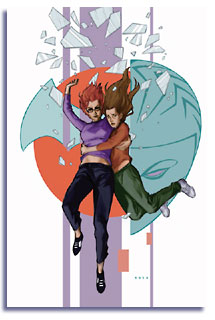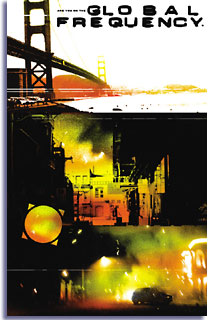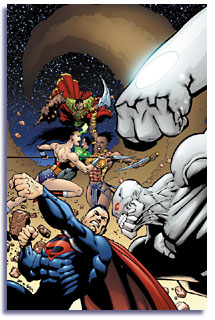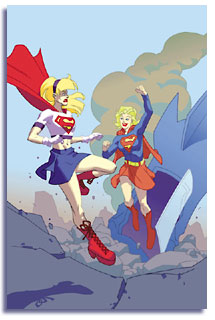|
Hey
Kids! Comics!
Birds
of Prey #48
writer: Terry Moore
artists: Amanda Conner and Jimmy Palmiotti
Many
writers have danced around it, but nobody has managed to do
it: restore Barbara's legs. For at least one issue, Moore
crosses that line, but doesn't give Oracle time to really
explore the consequences. Still, we get her sense of joy.
What
we also get is a Black Canary who acts younger and sassier
than usually portrayed, and it makes sense. A far cry from
the new TV version of the character, we should remember that
Dinah is still the daughter of the original, and not likely
to be more than 28. Even Chuck Dixon, who had a strong handle
on the character, made her seem closer to 40. In Moore's hands,
the Birds of Prey are more fun than the book usually allows
them to be. This arc should pull in new readers, and just
in time.
If you've
been watching the TV show and wondering what the fuss was
about, go here. You'll understand, and wish for better television.
Rating:

Fantastic
Four #62
writer: Mark Waid
artists: Mike Wieringo and Karl Kesel
Once
again, the new creative team remembers what makes this "the
world's greatest comics magazine," even if that brag has been
removed from the logo. It's all in the little details, the
tiny pieces of wonder smack dab in the middle of the mundane.
Put it together and you get the fantastic.
Though
you might balk at Mr. Fantastic needing to do his best work
in the middle of Times Square, Waid provides a lot of other
throwaway bits that make you want to see more. Uncle Benjy
would make one heck of a great babysitter, while Johnny faces
evil far greater than Annihilus: corporate backstabbing.
And then,
of course, comes the real menace, hinted at last issue. It
all has something to do with Reed's PDA, which accesses an
entire universe for its storage space. Something has begun
leaking out, and it will take us a couple of issues to find
out what. This team makes it all so compelling, there's no
doubt we're sticking around.
Rating:

Global
Frequency #1
writer: Warren Ellis
artist: Garry Leach
One of
comicdom's best low-profile artists teams with one of its
most outspoken writers. The result should be magic. Instead,
it's a pale rehash of a lot of other popular books, many by
Ellis himself.
Being
from the mind of Ellis, of course, Global Frequency
still has a some interesting plot ideas to it, but most of
them could just as well have fit in Wildcats, The Authority,
The Filth or possibly even Planetary. (And boy,
it's annoying that the latter book and Ministry of Space
remain unfinished for this project.) Once Miranda Zero steps
into a panel, you know that she comes from the same mold as
Jenny Sparks and Jakita Wagner, though she has no superpowers.
I admire
the effort to tell stories without resorting to standard superhero
clichés, and perhaps Ellis will do something unexpected with
the idea of a global watchforce made up of ordinary people.
So far, though, even the ordinary people thing seems forced,
with a paranoia that gets talked about more than actually
shown. We're told being called to Global Frequency would be
dreadful, but beyond the writer's captions, it's just not
there.
Because
Global Frequency echoes other books so strongly, it's
hard to want to give it a chance.
Rating:

Liberty
Meadows #28
story and art: Frank Cho
The shift
over to Image has done wonders for Cho, and not just because
of the format change that allows the strips to run as actual
strips. For some reason, the artist seems freer to go back
and redo his strips in their unexpurgated form. The result
runs wildly from family friendly to a nice PG-13 (the fabulous
Jen-cam) you won't want to explain to your nephews, but it's
always funny.
Some
of the drama in the storylines has been undercut by Cho's
already given us the wrap-up to his comic strip a few months
ago. But just as in its newspaper days, Liberty Meadows
is not in a hurry to get caught up in plot (why would Dean's
DNA turn Frank into a pig? Don't ask). It's still a comic
strip, and one of the finest modern examples of the form.
Too bad his old newspaper syndicate couldn't quite see that.
Rating:

JLA
#74
writer: Joe Kelly
artists: Doug Mahnke and Tom Nguyen
The parallel
structure of "The Obsidian Age" storyline finally coalesces.
Last issue, we found out that the "real" JLA had died in Atlantis.
This issue, we see how. Somehow it's all going to work, and
for those who may have never read comics before, it's still
a safe bet that they'll come back to life.
What
makes it so cool remains in Kelly's unique take on the characters
mixed with Mahnke's vision. No artist has taken as much advantage
of the malleability of characters like Plastic Man and J'onn
J'onnz. While some may be annoyed by the daring of Kelly's
interpretations (not all of them fit "conventional" wisdom),
he never wavers from his take. Though the Wonder Woman/Batman
relationship may not exist outside of this title, it's consistent
enough here that their kiss should elicit a "well, duh" from
readers. But would Batman really love magic? That's for letter
writers to argue. Clearly, Kelly believes he does. And that's
enough.
Rating:

Peter
Parker: Spider-Man #49
writer: Paul Jenkins
artists: Mark Buckingham and Wayne Faucher
Already,
the shockwaves of Kevin Smith's impending arrival are here.
Within two pages, Jenkins has Spider-Man doing blue. It's
not necessarily out of character, but it's more blunt than
we usually get in this title. But then, the whole opening
sequence just seems rushed, as Spider-Man gets the answers
he seeks so casually that you have to wonder if you missed
something.
Eventually,
it gets to action and the creation of a new super-villain
with a little more potential than Typeface. Along the way,
Spider-Man doesn't do much to fight his attraction for new
superheroine (or maybe truly goddess) Tara, who raises another
point. Why do heroes from other countries always have
a specific cultural tie-in so you know exactly which nationality
they are? Or does the U.S. just suffer a paucity of cultural
history for us to identify? Maybe I don't want that answer.
Rating:

Supergirl
#75
writer: Peter David
artists: Ed Benes and Alex Lei
Yes,
the post-U-DECIDE Peter David really does seem invigorated,
bringing in a whole new era, a whole new art team, and a whole
new Supergirl. And if you can't decide which new Supergirl
you like, we have a couple to choose from.
Finally
freed from the Earth Angel's shadow, Linda looks ready to
come into her own as the girl of steel. She's back to the
full-strength we expect, and has the added bonus of telekinetic
blasts. Gone is the shape-shifting ability, but that was really
just an extra. Of course, just as she starts finding her footing
in Leesburg, a rocket lands with a suspiciously familiar blonde
in it.
Don't
worry about getting lost in continuity. Everything you need
to know, David does a reasonable job of filling in. The main
cast gets re-established, and though there are a few references
to past events, they don't affect the story.
What
does affect the tale is the new art team, and it's a good
one. Benes and Lei manage to use the best techniques of all
the artists before them, so that the book looks familiar and
new. Most importantly, it looks good.
Rating:

|









